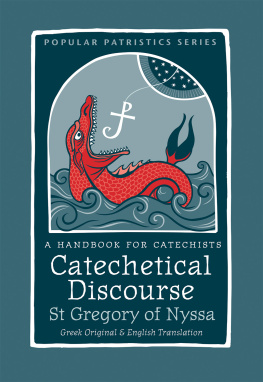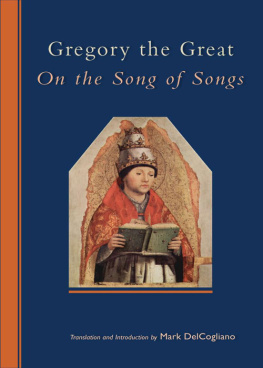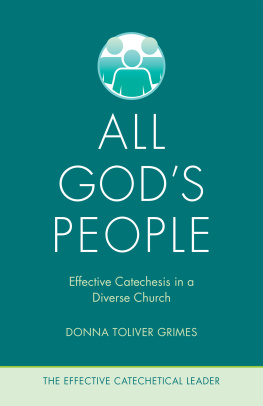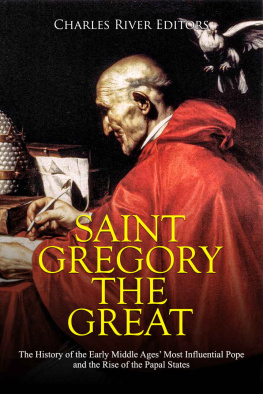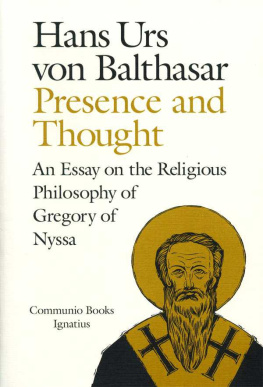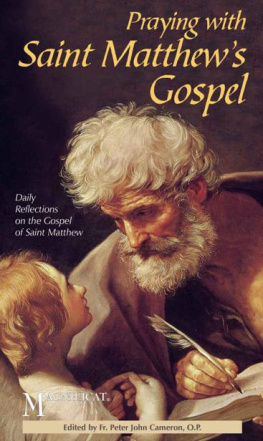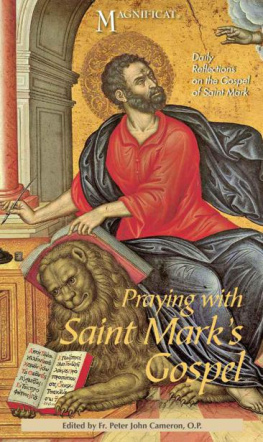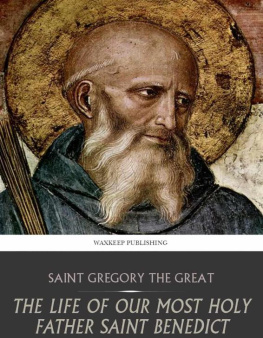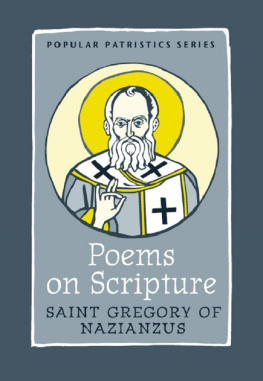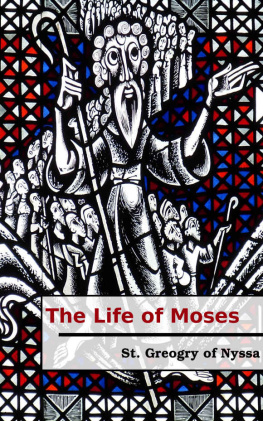saint gregory of nyssa
C atechetical D iscourse
A Handbook for Catechists
Introduction, Translation, Notes, Glossary, and Bibliography by
Ignatius Green
st vladimirs seminary press
yonkers, new york
Popular Patristics Series
Number 60
The Popular Patristics Series published by St Vladimirs Seminary Press provides readable and accurate translations of a wide range of early Christian literature to a wide audiencestudents of Christian history to lay Christians reading for spiritual benefit. Recognized scholars in their fields provide short but comprehensive and clear introductions to the material. The texts include classics of Christian literature, thematic volumes, collections of homilies, letters on spiritual counsel, and poetical works from a variety of geographical contexts and historical backgrounds. The mission of the series is to mine the riches of the early Church and to make these treasures available to all.
Series Editor
John Behr
Associate Editor
Augustine Casiday
copyright 2019 by
st vladimirs seminary press
575 Scarsdale Road, Yonkers, NY 10707
1-800-204-2665
www.svspress.com
isbn 978-0-88141-651-0
issn 1555-5755
All Rights Reserved
Abbreviations
ANF
The Ante-Nicene Fathers. Edited by Alexander Roberts and James Donaldson. Buffalo, 18851887. 10 vols. Repr., Peabody, MA: Hendrickson, 1994.
GNO
Gregorii Nysseni Opera. Edited by Werner Jaeger, et al. Leiden: Brill, 1920
LSJ
A Greek-English Lexicon . Edited by Henry George Liddell, Robert Scott, and Henry Stuart Jones. 9th edition. Oxford: Clarendon Press, 1996.
LXX
Septuagint (the Greek translation of the Old Testament used by the Fathers of the Church)
NPNF
The Nicene and Post-Nicene Fathers, Series 1. Edited by Philip Schaff. New York, 18861889. 14 vols. Repr., Peabody, MA: Hendrickson, 1994.
NPNF
The Nicene and Post-Nicene Fathers, Series 2. Edited by Philip Schaff and Henry Wace. New York, 1890. 14 vols. Repr., Peabody, MA: Hendrickson, 1994.
PG
Patrologia Graeca. Edited by J.-P. Migne. 162 vols. Paris, 18571886.
PPS
Popular Patristics Series. Yonkers, NY: St Vladimirs Seminary Press, 1996
Preface
Many people have helped me with this project. I cannot sufficiently thank my wife, Presbytera Aimilia, for her love, patience, and support. I owe a great debt to Fr John Behr for guiding me through my academic career, for sharing his love of grappling with a text, and for accepting this translation in the Popular Patristics Series. I am also deeply grateful for Brittany Laubers willingness to check my translation against the Greek. The text is surely better for her aid, and any remaining defects or infelicities are mine alone. Finally, I want to thank Fr John and Mat. Brenda Mikitish for their careful proofreading, and Amber Schley Iragui, who took the rough sketch I gave her and created such a striking cover.
I am thankful to have had this opportunity to explore the Catechetical Discourse and to immerse myself in St Gregorys other works. The beauty of his theological vision is deep, far ranging, and compelling. He has much to offer our age, which in many ways resembles Julian the Apostates project: he rejected Christ and the Church, but ended up aping the beauty and love found in the gospel. The answer to an apostate age is both defense and persuasion. St Gregory can be emulated today, both in his adroit defense of the faith, and in the persuasive power of his portrayal of the surpassing beauty of Christ. He shows us how to engage in a discourse that is properly catechetical, so that the Church may be increased by the addition of those being saved and that they too may adore Christ on bended knee, knowing him and naming him as the Church teaches us, crying out:
O radiant fountain, ever gushing with life, creative power co-eternal with the Father, who with surpassing beauty hast fulfilled the whole economy of the salvation of mankind; O Christ our God, who didst burst the indestructible bonds of death and the bolts of hades, and hast trampled down multitudes of evil spirits; who didst offer thyself for us as a blameless victim, giving thine immaculate body as a sacrifice, inviolate and unblemished by any sin, and through that dread and indescribable act of sacrifice, didst bestow eternal life upon us; who didst descend into hades and break down its eternal bars, showing forth the way up to those who sat below; thou who, in thy wisdom, didst bait and hook the ruler of evil, the dragon of the abyss, and with cords of gloom didst bind him in Tartarus, in unquenchable fire, confining him to the outer darkness by thine infinite might; O glorious Wisdom of the Father, who didst manifest thyself as a mighty ally to the oppressed, enlightening those that sat in darkness and in the shadow of death, thou Lord of eternal glory and beloved Son of the Father most high, Light everlasting of Light everlasting, Sun of righteousness
(Third Kneeling Prayer, Vespers of Pentecost)
To him be all glory, honor, and worship, with his unoriginate Father, and his all-holy, good, and life-giving Spirit, now and ever, and unto the ages of ages. Amen.
Rev. Ignatius Green
Pentecost 2019
Introduction
St Gregory of Nyssa
In the fourth century, St Gregory of Nyssa was a touchstone of Orthodoxy at the heart of the ages theological crisis, and his work was crucial to its resolution. He played a key role in the First Council of Constantinople (AD 381), which named him an exemplar of right belief.
The bishop of Nyssa also fascinates contemporary scholars, but here we find a quite different picture, or, rather, many different and conflicting portraits. Some see him as a sort of patron saint of contemporary concerns: an advocate of human rights (perhaps the first to condemn slavery unequivocally), a proto-feminist who deferred to his ascetic-theologian sister St Macrina, a sex-positive theologian who purportedly championed fluid notions of gender. This is not the place for a thorough evaluation of such claims, but this much must be said: Gregory is a complicated writer with great breadth and depth. Selecting isolated elements of his writings can produce startlingly different results: Gregory can be read in many different ways... he appeals to theologians of surprisingly diverse views, from radical feminists to conservative evangelicals.
Gregory was a true son of Cappadocia, a region in central Anatolia (modern-day Turkey), which played a part in the Christian story from the day of Pentecost (Acts 2.9). Near the beginning of the third century, St Alexander was a bishop in Cappadocia before he transferred to Jerusalem, where he supported Origens work as a teacher and preacher.
Gregory of Nyssa was born around AD 335. This rocked the family, and it also led to its further transformation. Emmelia became a monastic, and Peter, the youngest, was raised in a domestic monastery from the age of ten.
And where was Gregory in all of this? We know of only one event before the death of Naucratius, a vision or dream he had as a youth during the vigil for the forty martyrs of Sebaste.
Once Gregorys career in the Church began, it was marked by the events of his time: The rest of his history is Church politics. but it was the council itself that proved to be the turning point.
Emperor Theodosius, a supporter of the neo-Nicene cause, convened the council in May 381. Gregory figured prominently in the proceedingshe likely preached an opening address The last we hear of Gregory is in the list of participants at a council in Constantinople in 394.


